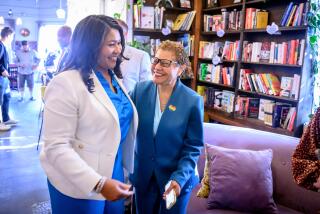Tensions Put Pressure on Dinkins to Live Up to Campaign Image : Racial relations: The mayor was expected to ease hostilities in multi-ethnic New York. But critics point to recent incidents of violence.
- Share via
NEW YORK — When a black teen-ager was killed in the Bensonhurst section of Brooklyn last summer after a run-in with a gang of whites, mayoral candidate David N. Dinkins made it clear what New York should expect from its top leader: “The tone and climate of the city does get set at City Hall.”
The perception that Dinkins could soothe racial tensions was probably the single biggest force behind his election as New York’s first black mayor. The last few weeks have brought a series of racial problems that have put the mayor under intense pressure to deliver on the expectations that he built.
“Though we cannot eliminate racial and ethnic friction overnight, we must take the first steps. Our beginning will, of course, be marked by small--sometimes indirect--steps. But even a journey of a thousand miles begins with a single step,” Dinkins said Monday.
But the mayor who exults in his city as a multi-ethnic “gorgeous mosaic” is feeling the cut of its sharp edges.
Each day seems to bring worse turmoil. Dinkins appears besieged, encircled by his detractors and undercut by the expectations that he himself raised. Some black leaders have gone so far as to publicly call him a traitor.
Dinkins faces two potentially explosive controversies in Brooklyn: As two juries have deliberated almost a week in the Bensonhurst slaying of Yusuf Hawkins, angry demonstrators have rallied each day outside the Brooklyn courthouse, and some of their leaders warn that violence is inevitable if the panels return anything less than a guilty verdict.
Meanwhile, blacks in Flatbush continue a four-month boycott of two Korean grocers that started with a dispute between one of the grocers and a black woman customer. While it is far from clear who was at fault in the original incident--the woman claims to have been beaten and the grocer contends that he merely pushed her to prevent her from shoplifting--it unmistakably tapped long-festering bitterness. Demonstrators have chanted such epithets as “Korean bloodsuckers” outside the stores, and have spat at customers who try to shop there.
A few blocks from the store, a group of more than a dozen blacks on Sunday beat three Vietnamese whom they apparently mistook for Korean.
Elsewhere in the city, smaller disputes add to the tension. A black City University professor is preaching black supremacy, while a white faculty member at the same school is saying that blacks are less intelligent and more prone to commit crime than whites. A group of white students at St. John’s University in Queens stands accused of raping a black woman. And Jimmy Breslin, one of the city’s most prominent columnists, has been suspended by New York Newsday after making racial comments about another staff member.
Dinkins’ low-key and cautious approach, which had initially seemed a soothing balm to the abrasion of former Mayor Edward I. Koch, now is being criticized as weakness and indecisiveness.
Roy Innis, national chairman of the Congress of Racial Equality, said in an interview Monday: “We’ve got to have a commitment to telling the hard truth. David Dinkins is not strong enough to do it.”
Innis accused Dinkins of “reverse racism” for failing to denounce the grocery store boycott that is “reeking with raw and naked, palpable racism.” He attributed Dinkins’ reluctance to the mayor’s association with Sonny Carson, the self-proclaimed “anti-white” leader of the boycott, who worked for the Dinkins campaign before being dismissed for anti-Semitic remarks.
Other blacks, however, have accused Dinkins of pandering to whites, particularly after the mayor made a rare foray onto prime-time live television last Friday to appeal for tolerance. “We must repress our rage,” the mayor said.
“He is a lover of white people and the system. And last night, he bashed black people,” said C. Vernon Mason, a lawyer who has been involved in a number of racial cases. “He ain’t got no African left in him. He’s got too many yarmulkes on his head.”
Mason made his comments at a rally Saturday, where he called the mayor “a traitor,” and some people in a crowd of hundreds chanted, “Judas, Judas.”
Many of Dinkins’ critics seem to suggest that as a black, he should automatically hold sway over New York’s black community--a view that does not recognize the diversity of opinion and outlook among blacks in the city.
One source in Dinkins’ Administration noted that the mayor has alienated some factions, who say they are disappointed in the number of blacks he has appointed to key posts at City Hall. Others have not forgiven Dinkins’ denunciation of the Rev. Louis Farrakhan, the black Muslim leader who once described Judaism as a “gutter” religion.
Dinkins’ Friday night address won high marks from many quarters, however. Former Mayor John V. Lindsay described it as “superb.”
Nonetheless, any hopes that it might have turned the tide were dashed less than 36 hours later, when the three Vietnamese were beaten by the group of blacks who thought they were Korean. Police on Monday arrested two people in connection with the assault, which Police Commissioner Lee Brown said was not related to the boycott.
Dinkins and several state legislators Monday held a news conference to announce state legislation aimed at crimes committed by groups, and to make a new push for a bill to stiffen penalties for crimes that are motivated by bias.
More to Read
Get the L.A. Times Politics newsletter
Deeply reported insights into legislation, politics and policy from Sacramento, Washington and beyond. In your inbox twice per week.
You may occasionally receive promotional content from the Los Angeles Times.










